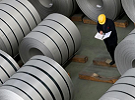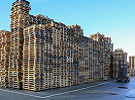 There's a major global raw material shortage. That's led to considerable price increases. And there's no end in sight yet. Whether it be wood, concrete, grain, plastic, cotton, or metal: there are no stocks. Yet, the industry's growing. Dutch machine manufacturer Sormac expects this situation to continue until at least the end of the year.
There's a major global raw material shortage. That's led to considerable price increases. And there's no end in sight yet. Whether it be wood, concrete, grain, plastic, cotton, or metal: there are no stocks. Yet, the industry's growing. Dutch machine manufacturer Sormac expects this situation to continue until at least the end of the year.
"We have to deal with raw material shortages and sky-high prices every day," says Roy Claessen, Sormac's head of purchasing. Parts are hard to come by, and their prices climb by the week. This price increase has been going on for some time but has accelerated in recent months. There are several reasons for this."
"Last year, when COVID-19 broke out, many raw materials producers reduced their capacity. The industry, incidentally, has grown enormously. That's led to significant shortages. Producers have now seemingly scaled up, but demand still exceeds supply. That results in extremely high prices."
The increased price of especially various metals and raw materials affects Sormac's machine development and production. ABN AMRO recently reported that this year, steel prices had already risen by some 15%. And basic metals like copper, aluminum, nickel, zinc, lead, and tin are already 16% pricier. Copper is only slightly cheaper than the €10,190/ton record price.
In addition, the industry has never grown as fast as it is now. The NEVI PMI* index shows that recovery in the industry is still going strong. The global pandemic caused a brief stop. However, despite that, there's no chance of an economic crisis on the industry side. But, on the production side, this means even longer delivery times.
Quotes have shorter validity
Roy says since around February, metal prices have shown a much higher-than-average upward trend. According to him, plastic price increases are something quite recent. "Our component suppliers depend on raw material suppliers. Components may become more expensive. But that doesn't automatically mean the machine is also that much more expensive."
"This is, of course, not without consequences. On the purchasing side, quotes are becoming valid for shorter times. An offer may be only valid for a week instead of the usual three months. Our sales department has also indicated that we need to tighten up our offers. Unfortunately, there's no other way."
The machine manufacturer is currently particularly struggling to find computer chips. "Components are becoming more intelligent and contain chips that just about everyone needs. We'd usually get these within three days. Now, it sometimes takes weeks. Another factor is that we work with better-known brands," explains Claessen.
"It's sometimes a real search to try and find some availability somewhere in the Netherlands or abroad. Sometimes there are alternatives. However, we only use these if we're sure they won't affect the finished product's quality." Roy expects these shortages and high prices to last until, at least, the end of the year.
Somrac is, however, optimistic. "We have good orders, and we're growing in staff numbers and capacity. Last year we took a new production warehouse into use; an extension of approximately 3,000m2. These are fantastic developments, with which we can meet the future positively," Roy concludes.
There are various reasons for the worldwide raw material shortages. For instance, the demand for raw materials from China has picked up considerably. At the beginning of 2020, COVID-19 shut almost the entire country down. China got the virus under control again after a short time. And their economy started growing again as the year progressed. That resulted in a considerably higher demand for raw materials. This economic growth can also be seen elsewhere, such as in the United States and Europe.
Pallet shortage threatens Prices for other raw materials like timber and concrete are also rising. Not only the construction industry, which uses a lot of wood, faces long delivery times. Pallet and crate manufacturers are also suffering. In recent months, timber prices have more than doubled, and these aren't going to stabilize any time soon. Daily prices currently apply to wood, which price used to remain stable throughout the year.
Prices for other raw materials like timber and concrete are also rising. Not only the construction industry, which uses a lot of wood, faces long delivery times. Pallet and crate manufacturers are also suffering. In recent months, timber prices have more than doubled, and these aren't going to stabilize any time soon. Daily prices currently apply to wood, which price used to remain stable throughout the year.
"Contracts could be fixed for longer. If I send out a quote, it must be accepted within a week. Or we have to adjust the sales price," Robert Helder of Hoekman Houtindustrie recently told AGF.nl. "These availability issues concern not only sawn timber, but also board material like chipboard, OSB, MDF, and hardboard. These are all frequently used in export and transport packaging."
Rising prices are still hitting the pallet industry harder than the crate industry. That's because crate supplies are often covered well in advance. To keep pallet stock capacities up to standard, new wood has to be continually imported. Recently, that's delayed deliveries. So, now, used pallet stocks are also starting to run out.
Roy Claessens
r.claessen@sormac.nl  Sormac
Sormac
Huiskensstraat 68
5916 PN Venlo
T: +31 (0)77 351 8444
info@sormac.nl
www.sormac.nl
* Nevi publishes the PMI: Purchasing Managers' Index every workday of the month. It's a summarized index that provides an overall picture of different industries' economic activity.
